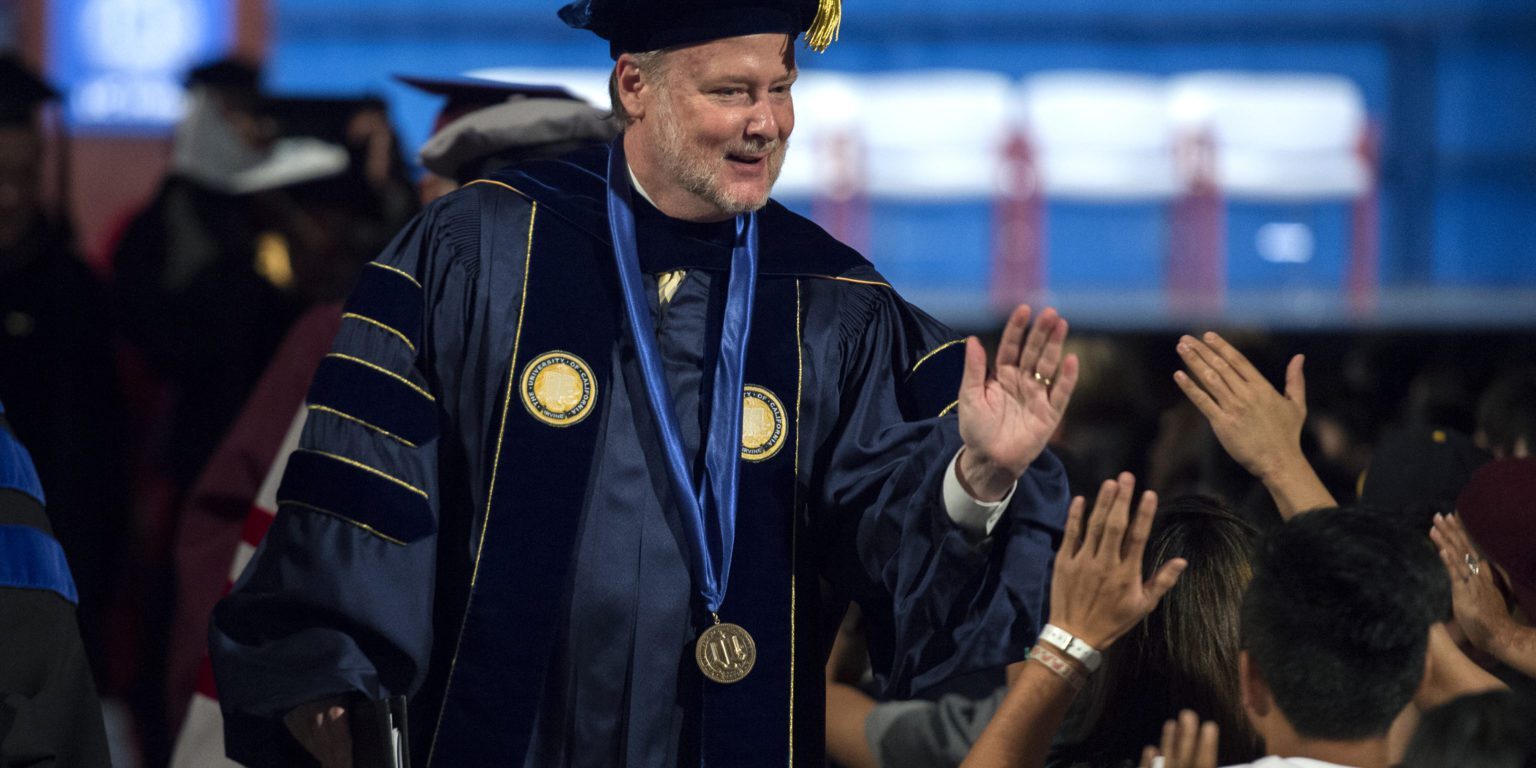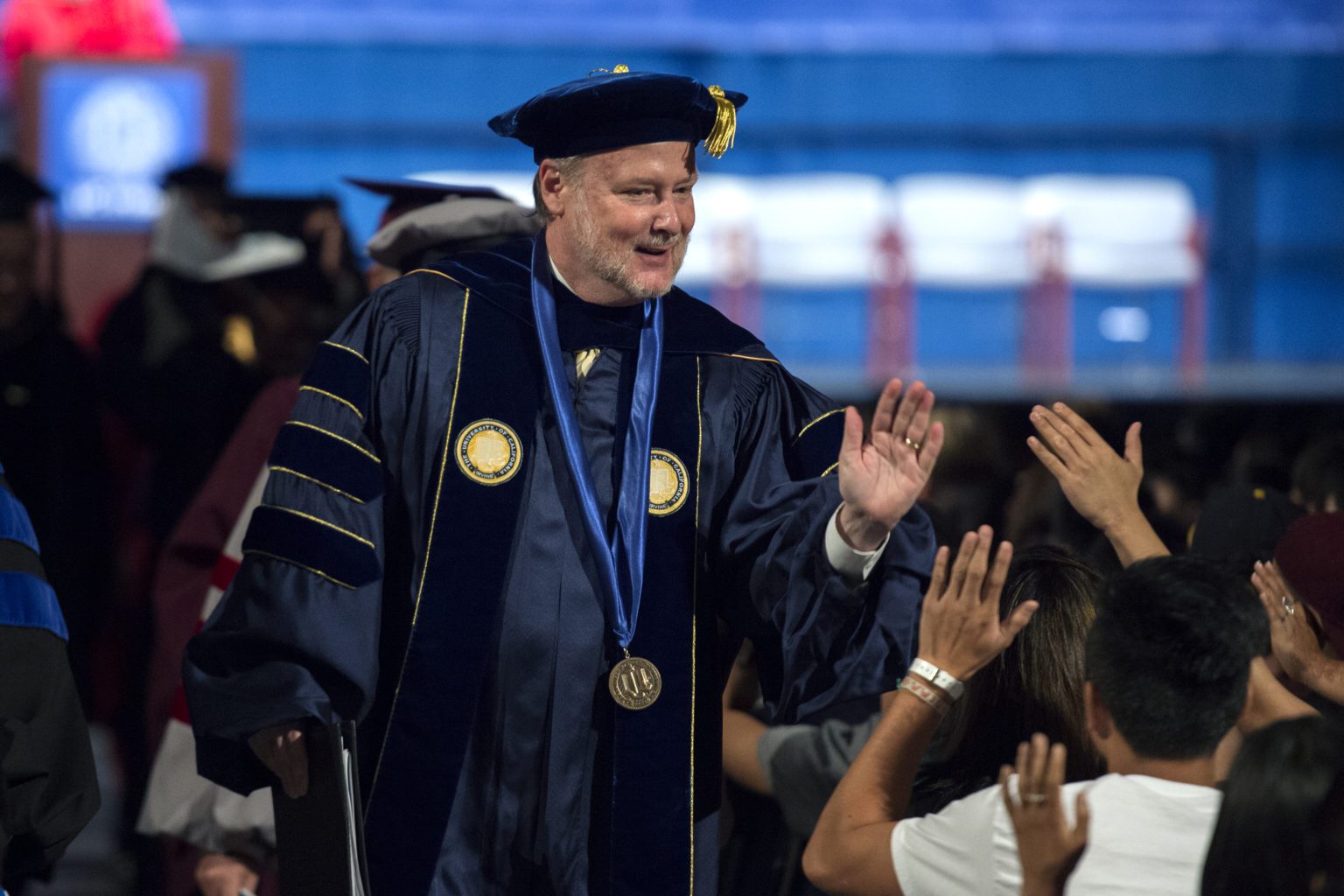
“Making a Difference” is Orange County Business Council’s feature series that brings the face and voice of OCBC
members to life by sharing how they’re making a difference in their communities.
November 2022
Welcome to OCBC’s new quarterly human-interest series, “Making a Difference.” This inaugural column—marking National First-generation College Student Day on November 8—features the heads of three Orange County universities who are first-generation college graduates: President Michael Thomas of Concordia University Irvine, Chancellor Howard Gillman of UCI and President Fram Virjee of Cal State Fullerton. Tasks such as choosing a major and balancing family and studying can be overwhelming for students whose parents didn’t earn a college degree. But the same grit and perseverance that helps these students to cross the finish line to earn their degree is the same grit and perseverance that they bring to the workplace.
Can you guess who worked at a chainsaw store for their first job? Who was a drummer in a garage band? Who transferred from a Community College? And who grew up on a ship? Read their Q&As to get to know these leaders and how their stories make a difference in Orange County.
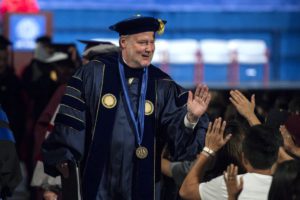
Howard Gillman, Chancellor
University of California, Irvine
Q: Describe what it was like growing up in your hometown? Your family?
A: I grew up an only child in a 900-square-foot house in North Hollywood. My dad worked as a laborer for a construction company and then became a real estate agent, and my mom was a homemaker until I started junior high school when she became an office worker at Van Nuys Elementary School. There were tough times, but my parents shielded me from most of it, and they always made sure I knew that I could have all the books I wanted. I kept busy playing on the streets of the neighborhood, reading and listening to music; eventually, I developed a serious interest in learning magic (the sort of thing an only child could spend a lot of time on by himself) and becoming a drummer (symphonic band, orchestra and eventually garage bands). Starting around age 12, I made money doing magic at birthday parties, bar mitzvahs and other gatherings, but I got my first real regular job when I was 15½, after Earl’s Toys and Hobbies opened a magic section and needed someone to run it. I think I’ve earned a paycheck every month since then.
Q: What led to your decision to attend college and pursue a degree?
A: My parents always emphasized the importance of education, maybe because they never had the opportunity to get more education after high school. I don’t remember a specific conversation where I “decided” to attend college; it was just something I knew I was going to do. The main question was where, because we couldn’t afford for me to go away to college or to live in the dorms so I had to pick a place within driving distance. I also had to work, so I needed to fit that into my schedule. That meant either Cal State Northridge or UCLA. I was lucky enough to get into UCLA and commuted from my home.
Q: What were the two most difficult things about navigating college that you wish someone had told you?
A: I needed to sign up for the right classes (to meet all requirements), create a schedule that also allowed me to get to my job, study hard, and (especially because I wasn’t in the dorms) find some group on campus that I could be part of, where I would meet new friends and have a support network. It wasn’t always easy managing class schedules and work schedules and time to study, but it never occurred to me that I had any other choice than to figure it out on my own.
Q: Who was the biggest influence in your life as you were pursuing your degree/s? What lesson do you still carry from that person/people?
A: Outside of friends and family, the biggest influences were two teachers. The first was my junior high band/orchestra teacher who taught a ragtag group of San Fernando Valley kids, some of whom could barely play their instruments that they could achieve excellence. He was supportive but also demanding – we could always do it better. The second was my high school A.P. history teacher, who was passionate about the topic and encouraged me even though I wasn’t doing very well in class. Together they instilled values and habits that were essential to my success in college: always strive for excellence, appreciate that learning new things is interesting and fun, work hard, and be disciplined.
Q: How has your academic journey as a first-generation college student impacted your career path?
A: Before college, my whole life was that little corner of the San Fernando Valley, which was fine but provided limited perspective on the world. College opened a vast new world to me – new topics to study, new groups of people to interact with, new perspectives, and new things you could dream of becoming. I fell in love with that world of inquiry, discovery, debate and discussion. And sometime during my junior year, I began to think for the first time that it may be possible to have a career that would allow me to make this world my home. And so, I started talking to professors about how to become a professor.
Q: What advice do you have for other first-generation college graduates/students?
A: Be proud and feel deserving because you are. Indeed, you’re not going to know some things, for example, how to interact with professors. But don’t let short-term lack of knowledge rob you of your justified confidence and excitement. Don’t feel overburdened by the expectations that members of your family have for your success; they just want what’s best for you. So, take full advantage. Meet people you would not have met otherwise and see how you are changed by exposure to their perspectives and experiences.
Q: How is your organization making a difference in Orange County?
A: UCI is the only major research university in the sixth most populous county in the United States, and great research universities make an incredible difference in the quality of life of people in their regions. We are the largest employer in Orange County. We contribute $7 billion to the regional economy. We bring in nearly $600 million in external funding to our region every year. We educate tens of thousands of California residents, many of whom come from Orange County. We have thousands of experts working with community partners to address issues and create a better future for all of us. Whatever someone thinks is central to the well-being of our community, UCI is a willing partner in making that difference.
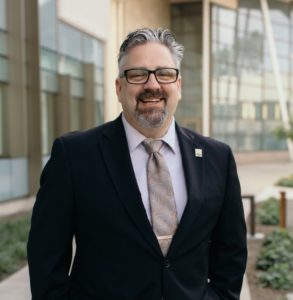
Michael Thomas, President
Concordia University Irvine
Q: Describe what it was like growing up in your hometown? Your family?
A: I grew up in Columbia Falls, Montana, a small, rural town known as the gateway to Glacier National Park. It’s beautiful there, and I spent a lot of time outdoors, hunting, fishing, and riding motorcycles. However, at that time, it was a depressed economic area, and most of my fellow high school graduates went into the timber industry or worked at the nearby aluminum plant. My father owned an auto repair shop dependent on the logging industry. In fact, my first job was working in a chainsaw store.
Q: What led to your decision to attend college and pursue a degree?
A: I was a little bit of a hellion in high school (or should I say rambunctious?) I got in trouble here and there, mostly because I was bored in school. Montana high schools didn’t provide college prep courses, and almost no one from my high school went to college. However, my parents never had the opportunity to attend college, and both regretted that. From my earliest years, college was an expectation. They made it very clear to my two siblings and me that we’d go to college. They didn’t exactly know what that meant, but they did know that a college degree would open opportunities to us that they never had. We outstripped their expectations, as the three of us collectively have earned eight college degrees.
Q: What were the two most difficult things about navigating college that you wish someone had told you?
A: I’m the first person in my extended family to attend college. Since my parents were not in a position to help financially, I paid every dime of my tuition from my B.A. to my Ph.D. Of course, that was hard, as I had to hold down several jobs. Secondly, I didn’t even know what questions I should be asking about college, including how one got enrolled. I started taking classes at the local community college and eventually transferred to Concordia College in Portland, OR. I still remember that I drove by myself to college and enrolled. I didn’t know anything about move-in and parent weekends, so I was confused as to why all these parents were around as I was carrying my stuff into my dorm.
Q: Who was the biggest influence in your life as you were pursuing your degree/s? What lesson do you still carry from that person/people?
A: My family and I went through confirmation classes together at a small Lutheran church in Montana when I was a teenager. During that time, I asked a lot of questions. Our pastor patiently fielded every one and ultimately became my mentor. Through that church, I got to know other youth from churches in the area, and that expanded my social network and enabled me to break away from the crowd that wasn’t helping me move in a positive direction. That completely changed the trajectory of my life. Ultimately, it was because of this formative relationship that I applied and was accepted to the pastor’s alma mater, Concordia College in Portland.
Q: How has your academic journey as a first-generation college student impacted your career path?
A: Although I now hold a Ph.D. from the University of Virginia and have served as a professor of ancient history and classical languages for over two decades, I’m never fully comfortable in academia, as it is generally such a privileged group. But my work ethic and values come from my blue-collar roots: work hard and don’t offer excuses. I was determined to earn the degrees and grab the opportunities that my parents never had. All in all, I think it was my grit and determination learned in Montana that has helped me achieve my dreams.
Q: What advice do you have for other first-generation college graduates/students?
A: Get involved. Nothing is more important for a first-generation college student than jumping into a club, intramurals, drama, choir, service organization, etc. Also, ask an academic advisor who the first-gen professors are. Nothing is more rewarding to me than hosting the first-gen students at the President’s House during the first month of school. They are shocked to hear how many faculty and staff at Concordia are the first in their families to earn a college degree, and from that knowledge, they know they belong.
Q: How is your organization making a difference in Orange County?
A: Four years ago, Concordia University Irvine created CONCORDIA serves. We cancel classes, provide transportation, and supply resources to allow students, faculty, staff, alums, parents, and donors to come together–nearly 1,000 strong–to focus on giving back. On that day, we serve nearly 20 organizations throughout Orange County. We focus on giving thanks for our many blessings by giving back to those around us.
Q: What’s the best piece of leadership advice you’ve received?
A: A leader in the Boy Scouts of America said something to me that I have never forgotten—try to live your life according to the Scout Law: Trustworthy, Loyal, Helpful, Friendly, Courteous, Kind, Obedient, Cheerful, Thrifty, Brave, Clean, and Reverent. I try hard each day to live according to those principles, even though I often mess it up.
Q: How do you manage high-pressure situations?
A: As a person of deep faith, I firmly believe I have been called to serve as the President of Concordia University Irvine. While there are days when I ask, “Why me?” I do believe that this is my calling. That assurance enables me to lean into high-pressure situations. However, it does not lead to overconfidence because I also believe that God has called others to serve alongside me to balance out my weaknesses. Since I am acutely aware of my shortcomings, I try to surround myself with dedicated, intelligent, and collaborative colleagues who share one abiding trait: the ability to laugh at themselves and with others. Tough, stressful situations are more easily managed with a team of people who can shrug their shoulders and just heartily laugh together because we know we’re in our true callings.
Q: What is your favorite part about living in Orange County?
A: The weather is amazing, and the Pacific is so close and accessible. I often explore roads on my motorcycle. Moreover, there’s always something to do or somewhere new to explore, from amazing restaurants to farmers’ markets, from theatre productions to sporting events. And as a raving soccer (fútbol) fan, I’m always taking in an LA Galaxy home game as a season ticket holder!
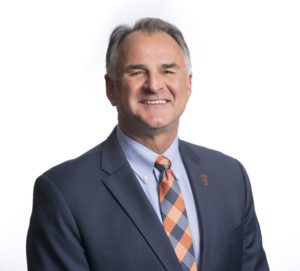
Fram Virjee, President
California State University, Fullerton
Q: Describe what it was like growing up in your hometown? Your family?
A: My dad was a merchant marine ship captain, and we traveled with him, so I was raised on a ship and around the world. We moved to the U.S. in 1967, so I could attend school. I grew up in a blue-collar city (San Pedro) that was full of diversity and difference. But that diversity was not always inclusive; my parents were considered an “interracial marriage”—my mom is Swedish, and my Dad was from India. At the time, it was not widely accepted, and as a child, I recognized it. I felt it but did not fully understand it. This was one of my first lessons on the importance of diversity and inclusion.
Q: What led to your decision to attend college and pursue a degree?
A: Neither of my parents attended college, but they always told me I was going to college and would be a doctor or a lawyer. I joke (sort of) and say when they saw my math grades, they immediately changed their tune and said, “you’re going to be a lawyer.” Simply put, not attending college was never an option. Interested in social justice and civil rights, I planned to be a lawyer for as long as I can remember.
Q: What were the two most difficult things about navigating college that you wish someone had told you?
A: First, it is okay to ask questions. As a first-generation college student and a young man, I was ignorant of how college worked and loathed to ask for help or seek navigation. Second, to explore all possibilities and experiences. There was so much going on at my university–inside and outside the classroom–I didn’t take advantage of–speakers, music, performances, seminars, etc. Looking back, I wish someone had pushed me to get more involved and seek experiences outside my comfort zone.
Q: Who was the biggest influence in your life as you were pursuing your degree/s? What lesson do you still carry from that person/people?
A: Robert Kennedy was, and remains, my North Star influence and role model for good and change. As I pursued my degrees and education, I was constantly reminded of his admonitions to be the change we seek and to create the ripples of hope around you that will create a tide of change for our communities and our nation. The person, however, who was the biggest influence on me and my life was my father. He taught me that I am anyone’s equal and have a right to opportunity, but what I do with that opportunity is up to me.
Q: How has your academic journey as a first-generation college student impacted your career path?
A: Being an immigrant and a first-generation college student has influenced everything I have done in my career. I believe in this country and the principles upon which it was founded. My goals and objectives in my career and in my life have been to assure that those principles and fundamental rights are afforded to all, not just to some. That was at the core of my mission as a lawyer in private practice, as the General Counsel for the largest university system in the nation, and now as the President of the largest undergraduate university in California.
Q: What advice do you have for other first-generation college graduates/students?
A: Stretch. Explore the unknown and seek out experiences outside your comfort zone. Believe in yourself. You are good enough, smart enough and strong enough. Demand as much excellence from yourself as you demand from others. Use your voice to speak up and speak out. Pay it forward.
Q: How is your organization making a difference in Orange County?
A: We are the largest undergraduate institution in California, and we are the ONLY CSU in Orange County. We have over 310,000 alumni, and 80% of those alumni reside within 50 miles of campus. We produce half of the nurses, teachers, accountants and engineers in the county. We rank #7 in the nation for social mobility and #3 in the nation for educating students from underrepresented communities. Our Titan graduates are lifting Orange County communities.
Q: What’s the best piece of leadership advice you’ve received?
A: Listen, listen, listen.
Q: How do you manage high-pressure situations?
A: Don’t take it personally. Be sure to laugh every day. Believe in what you do. Give grace, and you will receive it.
Q: What is your favorite part about living in Orange County?
A: The community and the opportunity for positive impact.
